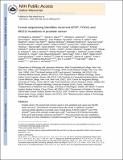Exome sequencing identifies recurrent SPOP, FOXA1 and MED12 mutations in prostate cancer
Author(s)
Barbieri, Christopher E.; Baca, Sylvan C.; Lawrence, Michael S.; Demichelis, Francesca; Blattner, Mirjam; Theurillat, Jean-Philippe; White, Thomas A.; Stojanov, Petar; Van Allen, Eliezer; Stransky, Nicolas; Nickerson, Elizabeth; Chae, Sung-Suk; Boysen, Gunther; Auclair, Daniel; Onofrio, Robert; Park, Kyung; Kitabayashi, Naoki; MacDonald, Theresa Y.; Sheikh, Karen; Lander, Eric Steven; ... Show more Show less
DownloadLander_Exome sequencing.pdf (2.326Mb)
OPEN_ACCESS_POLICY
Open Access Policy
Creative Commons Attribution-Noncommercial-Share Alike
Terms of use
Metadata
Show full item recordAbstract
Prostate cancer is the second most common cancer in men worldwide and causes over 250,000 deaths each year. Overtreatment of indolent disease also results in significant morbidity. Common genetic alterations in prostate cancer include losses of NKX3.1 (8p21) and PTEN (10q23), gains of AR (the androgen receptor gene) and fusion of ETS family transcription factor genes with androgen-responsive promoters. Recurrent somatic base-pair substitutions are believed to be less contributory in prostate tumorigenesis but have not been systematically analyzed in large cohorts. Here, we sequenced the exomes of 112 prostate tumor and normal tissue pairs. New recurrent mutations were identified in multiple genes, including MED12 and FOXA1. SPOP was the most frequently mutated gene, with mutations involving the SPOP substrate-binding cleft in 6–15% of tumors across multiple independent cohorts. Prostate cancers with mutant SPOP lacked ETS family gene rearrangements and showed a distinct pattern of genomic alterations. Thus, SPOP mutations may define a new molecular subtype of prostate cancer.
Date issued
2012-05Department
Massachusetts Institute of Technology. Department of BiologyJournal
Nature Genetics
Publisher
Nature Publishing Group
Citation
Barbieri, Christopher E, Sylvan C Baca, Michael S Lawrence, Francesca Demichelis, Mirjam Blattner, Jean-Philippe Theurillat, Thomas A White, et al. “Exome sequencing identifies recurrent SPOP, FOXA1 and MED12 mutations in prostate cancer.” Nature Genetics 44, no. 6 (May 20, 2012): 685-689.
Version: Author's final manuscript
ISSN
1061-4036
1546-1718